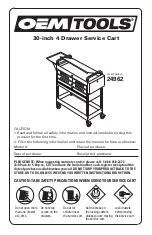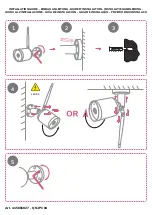
5/6
ANTI-TIP RESTRAINT ASSEMBLY INSTRUCTION
The best way to preserve and extend the life of your outdoor wood furniture is to cover it with a waterproof
cover when it's not in use, store it in a cool, dry place like a garage or shed during the winter months, and
keep the wood hydrated with products like linseed oil a couple times per year. The less exposure your
wood furniture has to sun, wind, rain, and snow, the longer it will last. Woods that are stained or painted
should be sanded and re-stained or repainted as needed to protect the elements from penetrating the
surface. Wood left in direct contact with wet surfaces will quickly become saturated and rot. When wood
does get wet, dry it off as quickly as possible.
It's also important to place your outdoor wood furniture on a surface where water won't pool. A patio or deck
is an ideal spot, and you should consider paving stones or a bed of rocks for wood furniture out in the
garden. Wood left in direct contact with wet surfaces will quickly become saturated and rot. When wood
does get wet, dry it off as quickly as possible or leave it out in the sun to dry.
Frequently exposed to harsh conditions or damp surfaces, wood furniture will begin to show signs of wear
and deterioration. Signs of damage may include checking (cracking or splitting), swelling, rotting, and
discoloration. In addition to protective covers and off-season storage, you can further prevent this type of
damage by keeping woods well-hydrated with products like linseed oil. Saturate your furniture with the oil
several times per year. Well-oiled wood will be better-protected from the elements and will retain its color
and smooth surface longer. Woods that are stained or painted should be sanded and re-stained or
repainted as needed to protect the elements from penetrating the surface.
Take time to learn more about how your particular type of wood tends to weather. Some woods, like pine,
will require frequent staining or oiling, while a wood like cedar has natural oils that make it resistant to
cracking and moisture rot. Woods like teak will turn a silver grey when left untreated, and many outdoor
wood furniture owners look forward to this transformation.
Finally, dirt build-up leads to deterioration, so keeping your outdoor wood furniture clean will give it a longer
life. Clean it well two or three times per year with water, mild soap, and a soft cloth. (This is also the perfect
time for a periodic hardware check.) We recommend using a product specifically designed for cleaning
wood furniture. Hose it down before you start to remove cobwebs and caked-on dirt. Do not use abrasive
cleaners, bleach, or scouring products that will affect the finish. Dry the furniture thoroughly when done.
Poolside furniture should be hosed down after each use to minimize chlorine damage.
.
MAINTENANCE AND CARE TIPS FOR OUTDOOR
WOOD FURNITURE
MAINTENANCE AND CARE TIPS FOR OUTDOOR WOOD FURNITURE
Summary of Contents for NWF004-2
Page 6: ...6 6...
























